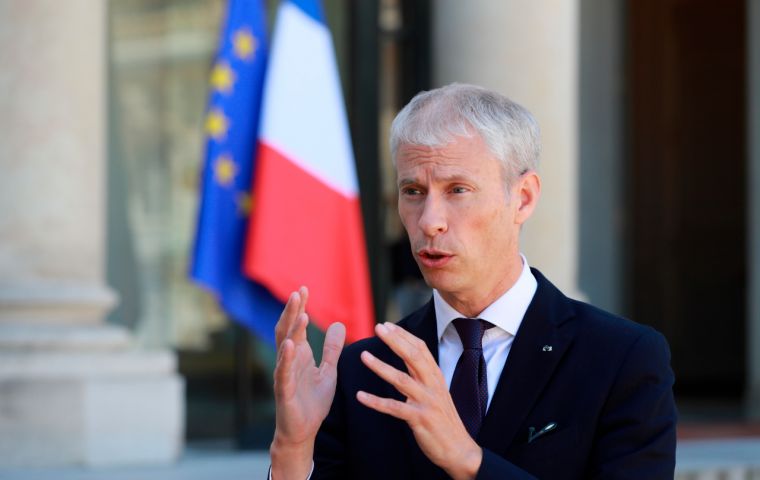MercoPress. South Atlantic News Agency
France want “environmental and health standards” guarantees from Mercosur to sign the trade accord
 The French foreign trade minister Franck Riester said Paris will not sign, but “it does not mean our withdrawal”
The French foreign trade minister Franck Riester said Paris will not sign, but “it does not mean our withdrawal” Mercosur/European Union trade agreement signing delayed because of a demand from France for guarantees referred to as “environmental and health standards” from country members of the South American block.
The French foreign trade minister Franck Riester said Paris will not sign, but “it does not mean our withdrawal, but we will only be satisfied with a political declaration on environmental commitments from the four countries involved (Argentina, Brazil, Uruguay and Paraguay), and that will take a long time,” minister Riester.
The French minister held a meeting of the EU Trade Policy Monitoring Committee, which brings together parliamentarians, officials, non-governmental organizations (NGOs), trade unions and employers.
Portugal’s prime minister, António Costa, had previously indicated that he had agreed with Argentine President Alberto Fernández on a “coordination of efforts” to advance the agreement between the European Union and Mercosur during the six months that Portugal holds the rotating EU presidency.
“I spoke with Alberto Fernández about the coordination of efforts between the Portuguese presidency of the Council of the EU and the ‘pro tempore’ Mercosur presidency to move the EU-MERCOSUR Agreement forward,” Costa wrote on his official Twitter account after a videoconference with Fernández, whose country currently chairs the South American bloc.
“Portugal and Argentina are both committed to the Agreement, and we will work together during this six-month period,” he added, evoking the “historic closeness” between the two countries “at the moment when we take over the rotating presidencies of the EU and Mercosur.
The videoconference between the Portuguese prime minister and the Argentine president comes days after contacts between the Portuguese and Argentine foreign ministries to settle outstanding aspects for the trade agreement to come into force.
Portugal and Argentina have agreed that they will concentrate their efforts on the issues that still prevent ratification of the agreement, which will need to go through the European Parliament and the Congresses of each Mercosur country (Argentina, Brazil, Uruguay and Paraguay). However, the treaty may come into force unilaterally between Europe and each Mercosur country that approves the text.
Outstanding issues include technical aspects such as lists of geographical indications, covering products with designation of origin, and issues of strong political relevance such as the environmental issue, which has been questioned by European countries such as France.




Top Comments
Disclaimer & comment rules-

-

Read all commentsSome years ago I accompanied a truck driver on a delivery to a large agricultural fruit plantation in the interior of Rio Grande do Norte, Brazil. While the cargo was being unloaded, I had the opportunity to speak with the business manager. He indicated that all their production was sold to EU buyers, but they would love to crack the US market. The Americans, however, were duplicit in blocking these attempts under the guise of “environmental and health standards”. This was done (and still is, as far as I can see) in order to protect the profit margins of interested and connected parties from competitive trade.
Feb 09th, 2021 - 10:32 am 0Fort Hay
Feb 09th, 2021 - 12:00 pm 0The problem is complicated by Brazil's high tariffs on imported goods from the USA.
In a level playing field Brazil rightfully worries that imported goods could destroy its domestic production.
Commenting for this story is now closed.
If you have a Facebook account, become a fan and comment on our Facebook Page!